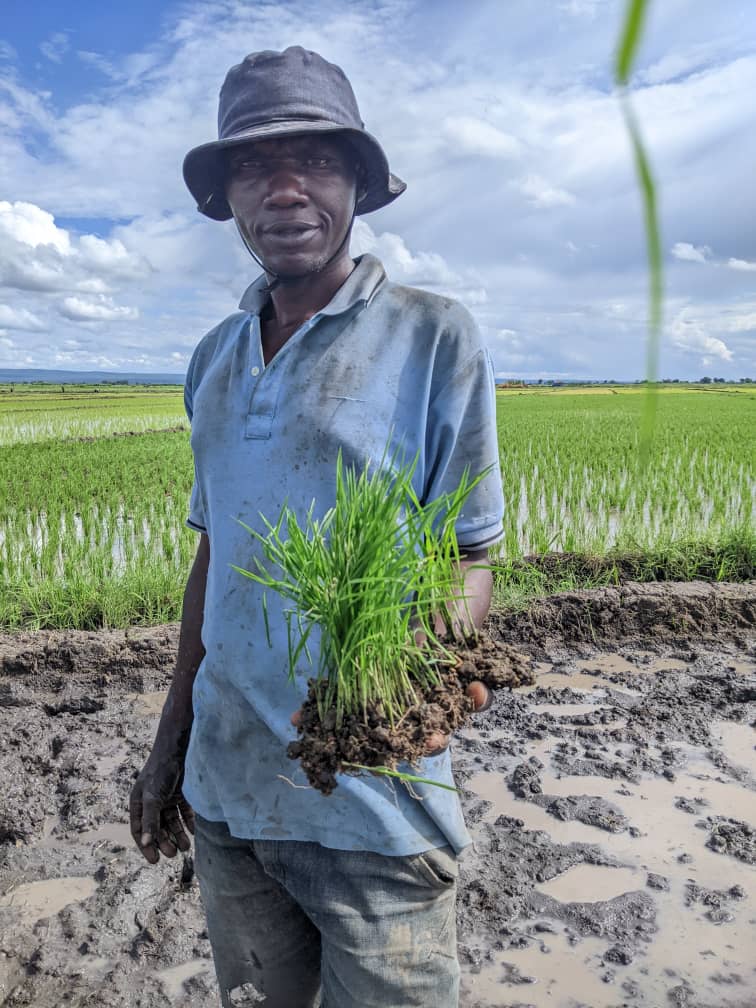
Funded by the Government of Flanders (Flemish International Climate Action Program), the project was developed with Ecosystem Equity (formerly Greenfi) and is also implemented in partnership with TARI-Ifakara. It aims to increase access to climate finance to support the transition of smallholder rice farmers from conventional to sustainable rice production.
In the Mbeya region, the soil is extremely fertile, and the economy is based on rice production. Farmers in the Usangu Plain contribute 24% of the 2.2 million tonnes of rice produced in Tanzania. They rely on precious water resources, which are threatened by increasing competition between farmers, livestock and wildlife. In fact, they all depend on water from the same river systems.
In its National Rice Development Strategy (NRDS) Phase II, the Tanzanian government has set a target of doubling the area under rice cultivation and doubling on-farm rice productivity by 2030. However, without sustainable and climate-smart rice farming practices, this is likely to double greenhouse gas emissions and increase the risk of biodiversity loss (as a result of clearing new land for lowland rice production) and conflict (over resources such as water).
Through the 'Future-proofing ecosystem and sustainable rice productivity in Tanzania through inclusive finance' project, funded by the Flemish government and in partnership with the Tanzania Agricultural Research Institute (TARI-Ifakara) and Ecosystem Equity, we aim to support the government's wider efforts to conserve critical ecosystems (wetlands and forests), reduce greenhouse gas emissions by 30-35% and thereby meet the NRDS targets.
Smallholder farmers (averaging 1.3 hectares of land) produce 90% of Tanzania's food and have a huge responsibility but little incentive to change their farming practices. They are seen as too risky and most financial institutions are sceptical about investing in them. More generally, although the rice sector is well developed, actors in the value chain have little focus on sustainability due to lack of awareness, lack of understanding of the added value of moving towards sustainability, and low cash flow for investment. As a result, farmers are hampered in adopting good practices by both lack of knowledge and limited financial resources.
We will develop, put in place and evaluate a scalable and sustainable financing mechanism to support the transition of small-scale rice farmers from conventional to sustainable rice cultivation practices. More specifically, we will:

Rikolto introduced the Sustainable Rice Platform (SRP) standard in two irrigation schemes in Uganda in 2018 (in partnership with TARI and the local government) and in five irrigation schemes in Tanzania in 2019. In the Iringa region, 6,000 smallholder farmers have been trained by Rikolto and the Kilimo Trust, increasing their productivity by 38%.
In both countries, we also intensified dialogue with governments to integrate the SRP standard into national policies. Uganda's MAAIF and MTC ministries included the SRP standard in their 10-year national rice development strategy. In Tanzania, as part of the task force leading the implementation of the national strategy NRDSII 2019-2030, we were also able to include the SRP methodology as part of the implementation framework.
We aim to scale up SRP projects as part of our Global Rice Programme, which is primarily funded by DGD and aims to achieve sustainable transformation of the rice sector at national, regional and global levels to provide quality rice to consumers and decent incomes to all actors in the rice value chain, especially smallholder farmers.

A climate-smart financing mechanism will be developed and piloted with key actors in the rice value chain to build evidence and demonstrate to other financial institutions that farmers who adopt sustainable farming practices are worthy of investment. They can ensure their solvency and reliability by reducing their production costs and increasing grain yields by applying SRP standards.
As Rikolto, we are responsible for convening and facilitating all value chain actors to design and pilot the climate-smart financing mechanism and for building the capacitiy of financial institutions to train and incentivise smallholder farmers to adopt sustainable rice production practices. To this end, we will use the “climate-smart lending” or “eco-credit” approach co-developed by Ecosystem Equity and the Global Innovation Lab for Climate Finance and endorsed by leading donors, banks, funds and DFIs.
With our strong knowledge and understanding of the local context and actors, we will facilitate the link between rice companies and smallholder organisations to develop long-term business relationships. The ultimate goal is to demonstrate through evidence and business cases that investing in sustainability is in the bottom-line interest of all actors in the rice value chain.

Before, I used to apply fertilisers without really understanding the soil’s needs, just guessing at what might work. I didn’t know how much or when to apply it, so I wasn’t getting the best results. Since the training, I apply fertilisers based on soil nutrient analysis, making sure I use the right type, at the right time, and in the right amounts. This has helped me optimize both my production and input efficiency.
Ecosystem Equity
Ecosystem Equity co-designed the project with Rikolto staff. Their input is based on their experience in implementing performance and sustainability-based incentive mechanisms. During project implementation, Greenfi will develop a value proposition for rice value chain actors and their financing partners to engage them in adopting green financing mechanisms and providing incentives to smallholder farmers.
TARI (Tanzania Agricultural Research Institute)
TARI is our research partner. Their role is twofold: first, to advise participating value chain actors and financing institutions on the range of sustainability practices and technologies appropriate to the geography and farmer engagement; and second, to collect, document and share data from the SRP pilot to build strong business cases for the adoption of SRP and climate-smart financing mechanisms.
CRDB Bank
CRDB is the largest Agri-lender in Tanzania with 50% of the market.
With the support of the Flemish government